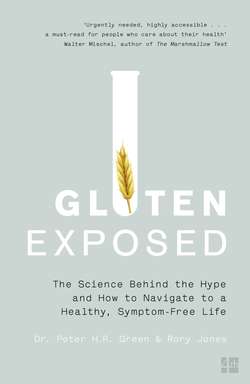Читать книгу Gluten Exposed: The Science Behind the Hype and How to Navigate to a Healthy, Symptom-free Life - Rory Jones, Dr. Green Peter - Страница 18
5 Supplements and Probiotics
ОглавлениеI had watched a TV show with [a well-known doctor] when he talked about a supplement—garcinia cambogia—for weight loss. The doctor had a very good reputation, and he seemed to think it was a good thing. A number of my friends love the show, and it’s impressive, very persuasive. I thought it seemed safe, and I took that for about a month. I didn’t feel any different, and I didn’t lose any weight but happened to see my doctor right before we were going on a trip to Mexico. The doctor called me over the weekend when he got my blood tests back and told me that I had hepatitis.
I thought, What!? It was unbelievable! Garcinia cambogia was so popular and so heavily advertised, and I thought that it didn’t seem like anything risky. My advice to someone taking something recommended on TV—don’t trust them or take anything without talking to your doctor first. Vitamins and supplements are an unregulated industry. This could have killed me and severely damaged my liver. I seem to have recovered completely but have to be checked regularly. I thought, It’s just a plant—I guess there’s nothing more lethal than nature.
(CAROL, 56)
Carol had acute drug-induced hepatitis that can be progressive and result in liver failure and even death. Luckily hers resolved because it was caught in time. She had a follow-up appointment at the Center early in the development of the disease, and a medical history showed that she had recently started taking garcinia cambogia for weight loss. She stopped taking the drug after blood tests pinpointed the problem. The literature prominently lists hepatotoxicity (liver toxicity) as a side effect of garcinia cambogia—weight loss is not.
Hepatitis does not cause symptoms early in the disease, just biochemical evidence of acute hepatitis in the form of elevated liver enzymes. Later, symptoms of liver failure develop, including nausea, vomiting, anorexia, confusion, and coma. Drug-induced liver failure may result in death if not caught early. Carol soon learned what “just a plant” meant—and that “natural” does not mean “harmless.”
Half of all Americans take some type of herbal remedy, and more than $28 billion a year is spent on various vitamins, minerals, herbal preparations, and probiotics. This number is about $104 billion globally. While visits to medical professionals have remained steady over the past decade, consultations with alternative medical practitioners and health gurus have increased dramatically—along with the use of supplements.
A tsunami of herbs, minerals, vitamins, and probiotics fill the shelves in drugstores, natural food stores, and supermarkets. They are heavily advertised not just as dietary supplements but as good for your health and claim to treat a wide spectrum of conditions from prostate problems and depression to sexual dysfunction, anxiety, insomnia, thinning hair, weight loss, and more. They are also promoted as a pharmaceutical aid for diarrhea, gas, and bacteria lost through antibiotic use, vaginal yeast infections, oncoming colds and flu, and pain. Many believe that they are safer than prescription drugs whose adverse effects are stated in accompanying literature.
I read the warning label on the [drug] my doctor prescribed—it was longer than my college thesis. Looked as if it would probably cure me if it didn’t kill me first. The labels on my supplements have no [listed] side effects of note.
(SHARON, 65)
They’ve been using these as medical cures in China for centuries.
(ANGELA, 33)
The fact that they have been used for thousands of years in the East may be the only justifiable claim many supplements can make. Although there is little scientific evidence to support the medical claims made in the popular media about the effectiveness of supplements, most people consider them “natural” and basically safe. But several recent and scientifically rigorous studies have proved that there are some very dangerous trends in this unregulated industry, and some supplements may have life-threatening consequences. A recent study in the New England Journal of Medicine showed that approximately 23,000 emergency room visits each year—between the years 2004 and 2013—were due to “adverse events related to dietary supplements.”
